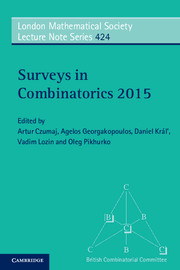5 results
Frontmatter
-
- Book:
- Surveys in Combinatorics 2015
- Published online:
- 05 July 2015
- Print publication:
- 02 July 2015, pp i-iv
-
- Chapter
- Export citation
Preface
-
-
- Book:
- Surveys in Combinatorics 2015
- Published online:
- 05 July 2015
- Print publication:
- 02 July 2015, pp vii-viii
-
- Chapter
- Export citation
Contents
-
- Book:
- Surveys in Combinatorics 2015
- Published online:
- 05 July 2015
- Print publication:
- 02 July 2015, pp v-vi
-
- Chapter
- Export citation

Surveys in Combinatorics 2015
-
- Published online:
- 05 July 2015
- Print publication:
- 02 July 2015
Testing Expansion in Bounded-Degree Graphs
-
- Journal:
- Combinatorics, Probability and Computing / Volume 19 / Issue 5-6 / November 2010
- Published online by Cambridge University Press:
- 09 June 2010, pp. 693-709
-
- Article
- Export citation



 . We prove that the property-testing algorithm proposed by Goldreich and Ron with appropriately set parameters accepts every α-expander with probability at least
. We prove that the property-testing algorithm proposed by Goldreich and Ron with appropriately set parameters accepts every α-expander with probability at least  and rejects every graph that is ϵ-far from any α*-expander with probability at least
and rejects every graph that is ϵ-far from any α*-expander with probability at least  and
and  .
.